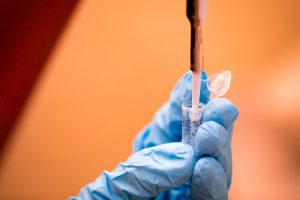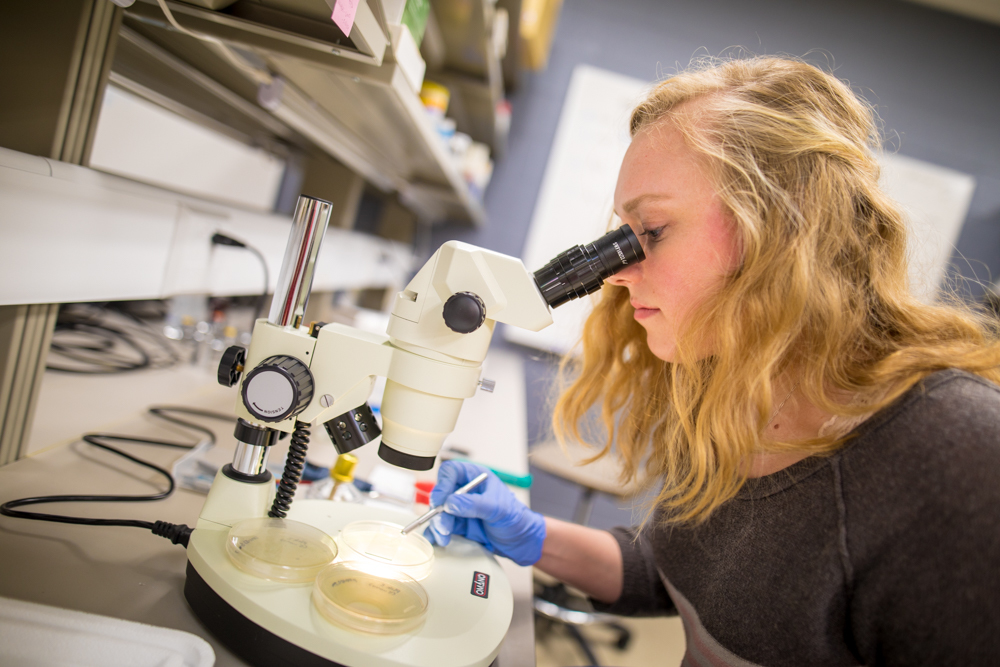Five undergraduate students at Eastern Mennonite University have been awarded grants to work with faculty on mentored research projects this summer.
The Glenn Kauffman and Roman Miller Research Awards of $2,500 each will fund the following research projects:
- Sierra Martin will work with Professor Greta Ann Herin on a project titled “The role of redox and amino terminal domains of NMDA receptors in excitotoxicity,”
- Yonas Ketsela with Herin on “Metabolic glutamate receptor 7a is inhibited by lead (Pb2+) in a concentration dependent manner in Xenopus oocytes,”
- Hannah Walker with Professor Matthew Siderhurst on “Analyzing of volatile profiles of roasted Hawai’ian coffee damaged by the coffee borer (Hypothenemus hampei),”
- Leah Lapp with Siderhurst on “Differentiating coffee damage using an electronic nose,” and
- Caroline Lehman with Professor Kris Schmidt on “A study of apoptotic pathways in Caenorhabditis elegans: Is unc-53 involved?”
Last year’s sole award funded data collection in the Bergton area watershed to build water quality research. Senior Amanda Williams and recent graduate Hannah Daley investigated the relationship between canopy cover and stream water temperature in two headwater streams.
The awards are sponsored by donors to the Daniel B. Suter Endowment Fund and the CT Assist Grant Fund, and can be used for student summer research wages, research supplies, and travel and fees to present ongoing or past work at a scientific meeting.

“Encouraging student research is an important goal of the Daniel B. Suter Endowment Fund,” said Stephen Cessna, a biochemistry professor who holds the Daniel B. Suter Endowed Chair. “These awards will provide opportunities for biology and chemistry students to build the key skills of scientific inquiry from writing the proposal to presenting and potentially publishing their findings.”
The awards are named for emeritus professors Glenn Kauffman (chemistry) and Roman Miller (biology), each of whom were “champions of undergraduate involvement in authentic scientific research at EMU,” said Cessna. Over their 30-plus year tenures, each worked with more than 40 undergraduates on research projects ranging in topics from organic blueberry production to the synthesis of new cyclic organic compounds.
Read about the award application requirements.
Such grants bolster the ever-growing spectrum of biology and chemistry research projects by students and faculty:
- Cerrie Mendoza interned with a collaborative pilot project between the Smithsonian Institution’s National Museum of Natural History, the U. S. Geological Survey, Eastern Mennonite University and James Madison University, gathering and sequencing the DNA of genetic samples from certain North American species of salamanders that were first collected and described 50 years ago.
- Hannah Daley and Janaya Sachs, working with professors Tara Kishbaugh and Doug Graber Neufeld, gathered baseline water quality information and barium and strontium levels in a stream in northwest Rockingham County, in anticipation of possible hydrofracking. The data will give a baseline from which to compare post-hydrofracking samples, in order to assess the extent of any contaminant releases.
- Diego Barahona and Katherine Lehman, along with Siderhurst and collaborators from the University of Guam, conducted a pilot project to evaluate the concept of using radio-tagged coconut rhinoceros beetles to detect cryptic breeding sites, a technique they hope will eventually be useful in eradication efforts. During the study they followed 19 beetles at two locations in Guam.
- Sam Miller investigated how noni volatiles change with ripening as part of Siderhurst’s exploration of the importance of odors in the way humans taste and experience food. They were coauthors of a Journal of the Science of Food and Agriculture article published in February 2018.
- Rachel King, Jason Spicher, Kaylee Ferguson, Braden Herman and Jared Fernandez assisted with Professor Julia Halterman’s research about how diet affects gene expression in hypertension, by studying rats on intermediate-salt or high-salt diets. Students learned how to carry out animal studies, collect blood pressure measurements, dissect tissues and organs, purify RNA from tissue samples, create cDNA, and run quantitative RT-PCR experiments.
- Several students have worked with professors Jim Yoder and Neufeld to conduct a watershed assessment, restore two sections of stream and assess strategies to encourage adoption of best management practices by community members.
Read more about research by EMU students:
- Autoimmune disease and health literacy among topics of fall biomedicine research (2017);
- Four students gain research experience with National Science Foundation-funded ‘REU’ summer placements (2016);
- NASA agreement yields lab equipment, research and internship opportunities for science and engineering programs (2016)
- Groundbreaking research shows sustainably produced foods are a big factor in maintaining EMU’s low nitrogen footprint (2016);
- Student research on hypertension, caffeinated athletes and radio-tracked beetles rewarded at annual STEM symposium (2015).
